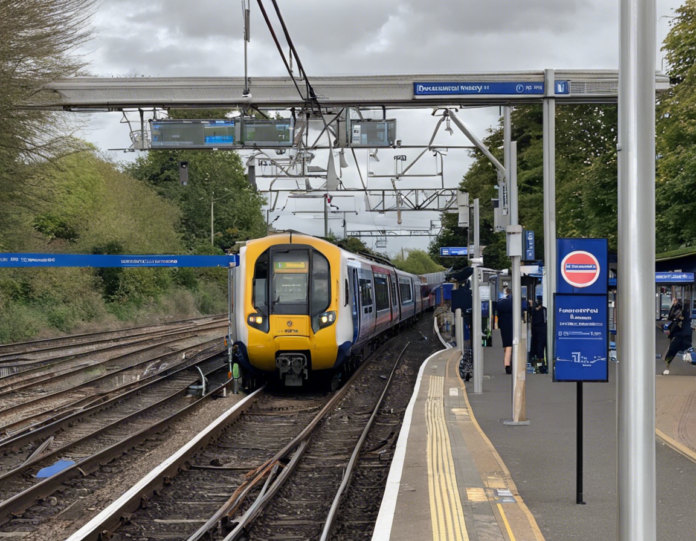The recent Beckenham train stabbing incident has left the community in shock and prompted discussions about safety and security in public transportation systems. The tragic event, which took place on a seemingly ordinary day, has once again raised concerns about the need for increased vigilance and measures to prevent such incidents from occurring in the future. In this blog post, we will delve into the details of the Beckenham train stabbing incident, explore some key factors that may have contributed to the tragedy, and discuss potential ways to enhance safety and security on trains and public transport systems.
Understanding the Beckenham Train Stabbing Incident
The Beckenham train stabbing incident unfolded on a typical weekday morning, catching passengers by surprise and leading to chaos and panic among commuters. Reports indicate that a lone attacker, armed with a knife, launched a sudden and unprovoked assault on multiple passengers aboard the train, resulting in several injuries and one fatality. The swift and brutal nature of the attack left many in shock and disbelief, as scenes of horror and chaos played out in the confined space of the train carriage.
Eyewitness accounts shed light on the harrowing moments during and after the attack, with passengers recounting their fear and confusion as they tried to make sense of the unfolding tragedy. The sudden and seemingly random nature of the violence left many questioning their own safety and security while using public transportation, a mode of travel that is meant to be convenient and reliable.
Factors Contributing to Public Transport Incidents
The Beckenham train stabbing incident has underscored several key factors that can contribute to security breaches and acts of violence on public transport systems:
-
Lack of surveillance: Inadequate security surveillance and monitoring systems on trains and at stations can create blind spots where criminal activities can go undetected.
-
Insufficient staff presence: A shortage of staff, including security personnel and customer service representatives, can hamper the ability to respond quickly to emergencies and maintain order on trains.
-
Mental health issues: Instances of violence on public transport can be linked to underlying mental health issues experienced by the perpetrators, highlighting the need for improved mental health support services.
-
Inadequate emergency response protocols: Delays in alerting authorities and coordinating emergency responses can exacerbate the impact of incidents and hinder efforts to contain and mitigate risks.
Enhancing Safety and Security on Public Transport
In the wake of the Beckenham train stabbing incident, there is a renewed call for authorities and transport operators to prioritize safety and security measures to protect passengers and prevent similar tragedies in the future. Some key strategies that can enhance safety on public transport systems include:
-
Increased police presence: Deploying uniformed and plainclothes police officers on trains and at stations can serve as a deterrent to potential attackers and provide reassurance to passengers.
-
Enhanced surveillance technologies: Installing CCTV cameras, panic buttons, and emergency communication systems can improve monitoring and response capabilities to address security threats promptly.
-
Training for staff and passengers: Conducting regular training sessions for staff on conflict resolution, de-escalation techniques, and emergency response procedures can empower them to act swiftly and effectively during crises.
-
Community engagement initiatives: Building strong relationships with the local community and encouraging passengers to report suspicious activities can create a culture of vigilance and cooperation that enhances overall security.
-
Mental health support services: Collaborating with mental health professionals to provide counseling and support services for individuals experiencing mental health challenges can help prevent incidents of violence on public transport.
-
Public awareness campaigns: Educating passengers about safety tips, emergency protocols, and reporting mechanisms can empower them to play an active role in maintaining a secure environment while traveling.
Frequently Asked Questions (FAQs)
- What should I do if I witness a violent incident on public transport?
-
If you witness a violent incident on public transport, your safety should be your top priority. Stay calm, move away from the scene if possible, and alert the authorities or train staff immediately.
-
Are public transport operators responsible for ensuring passenger safety?
-
Public transport operators have a duty of care to ensure the safety and security of passengers. This includes implementing security measures, conducting risk assessments, and responding effectively to emergencies.
-
How can I report suspicious behavior or security concerns on public transport?
-
Most public transport operators have dedicated hotlines or apps for reporting security concerns. You can also approach train staff or contact the police if you feel threatened or observe suspicious activity.
-
What role can passengers play in maintaining a safe environment on trains?
-
Passengers can contribute to a safe environment by staying vigilant, following safety guidelines, reporting concerns promptly, and treating fellow commuters with respect and consideration.
-
How can I access mental health support services while using public transport?
- Many public transport operators offer helplines or referrals to mental health support services for passengers in need. You can inquire with train staff or visit the operator’s website for more information.
The Beckenham train stabbing incident serves as a stark reminder of the importance of prioritizing safety and security on public transport systems. By implementing proactive measures, fostering a culture of vigilance, and collaborating with stakeholders and the community, we can work towards creating a safer and more secure environment for all passengers. Together, we can strive to prevent tragedies like this from happening and ensure that public transport remains a reliable and trusted mode of transportation for everyone.
